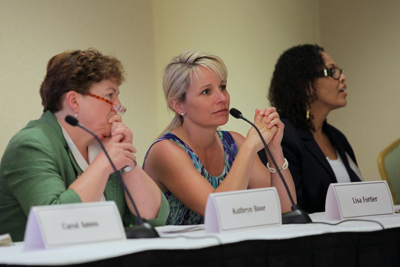Academic, industry leaders give advice on successful science careers
By Farhan Nuruzzaman

To be an effective leader, you must be confident in who you are and what you want to achieve, said Kathryn Boor '80, dean of the College of Agriculture and Life Sciences.
She was part of a panel of leaders in science and engineering at the "Key Steps to Defining and Achieving Success" session of the Empowering Women in Science and Engineering (EWISE) conference held at the Statler Ballroom, May 21. The objective of the two-day conference was to educate faculty, staff and students on navigating a career in the sciences.
Boor outlined the strategies she used to become a successful scientist and administrator.
She noted that it's important to let your students teach you new techniques, and to try your best to constantly expose yourself to new ideas. To lead effectively, she continued, it's crucial to have good organizational skills, take risks, and listen to and control your response to criticism.
"To continue to move ahead in your career, you must choose among the tasks that need your very best work and those that only need to be good enough," she said. "You need to see the difference, and you need to allocate your time appropriately."
Lisa Fortier '98, associate professor of large animal surgery in the College of Veterinary Medicine, emphasized the importance of full dedication to work. She advised being "critical and objective" in order to get a job done.
Success shouldn't be determined according to someone else's definition, said Karen I. Matthews '98, technology and market development manager at Corning Inc.
Matthews outlined her experiences transitioning from research science to business development. "Don't be scared to step out of your comfort zone and do something a little different from what you're doing," she said. "If you don't like it, then you can always go back."
She advised that once you get the job, you should make sure you clearly understand expectations, because otherwise you won't know how to perform. "Then you need to perform, perform, perform," she said.
Other panelists gave advice for dual-career couples. Joan P. Schwartz '65, a volunteer at the National Institutes of Health (NIH), related her experiences with her husband, a medical doctor, and the sacrifices they made to be together while still having successful professional lives.
"The moral of our marriage is that each time you think you're doing something for the other person, you'll likely end up happier than they are," she said.
She went from being a principal investigator at the NIH doing scientific research to a science policy administrator, working on issues including the career trajectories of women in science.
"The bottom line is that you should find a job that you really love to do, and then look at every opportunity that comes along not in a negative light but in a way that you may actually get more out of it than you ever imagined was possible," she said.
The session was moderated by Sheila Hemami, professor of electrical and computer engineering, and the conference was sponsored by the President's Council of Cornell Women. The conference was also organized and sponsored by Diversity Programs in Engineering, CU-ADVANCE and the Graduate School's Office of Inclusion and Professional Development.
Farhan Nuruzzaman '12 is a writer intern for the Cornell Chronicle.
Media Contact
Get Cornell news delivered right to your inbox.
Subscribe